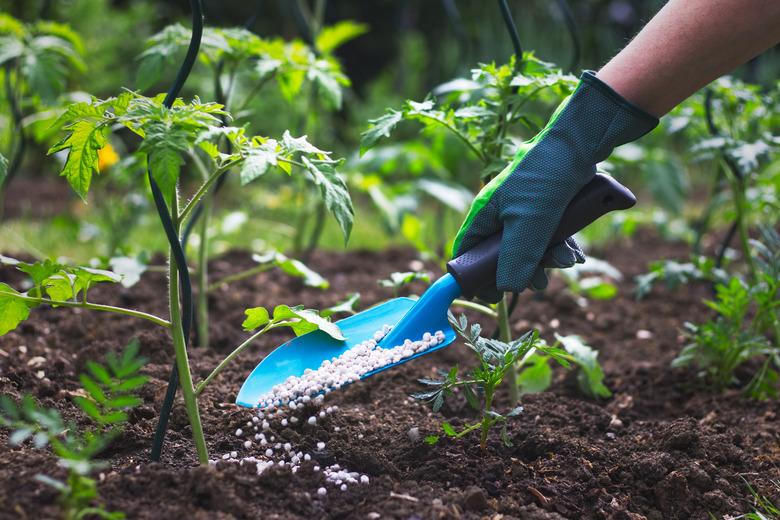What Is Low Nitrogen In A Fertilizer?
Most fertilizers contain nitrogen, but too much nitrogen causes plants to focus on leaf production to the detriment of vegetable or flower production. Gardeners can choose a low-nitrogen fertilizer for soils that already have enough nitrogen or for plants that require less nitrogen. Low-nitrogen fertilizers don't work well for some highly leafy plants, such as lawn grass.
Nitrogen in Commercial Fertilizers
Commercial fertilizer comes with three numbers on the packaging, indicating the amount of different nutrients in the fertilizer. The first number in the ratio stands for the percentage of nitrogen in the fertilizer mixture, and the second two stand for the percentages of phosphorus and potassium.
For example, when a product is labeled with a 5-10-10 ratio, the fertilizer contains 5 percent nitrogen and 10 percent each of phosphorus and potassium. When looking for a low-nitrogen commercial fertilizer, look for a fertilizer with a nutrient ratio that has a low first number or is labeled "low nitrogen."
Nitrogen in Organic Fertilizers
Organic fertilizers, such as manure, compost, straw, worm castings, and leaves, are made of natural substances and contain no chemicals. However, like commercial fertilizers, they also add nutrients to the soil.
Note that the nitrogen in organic fertilizers is not as readily accessible to plant roots as the nitrogen in commercial fertilizers. Before plants can uptake nitrogen from organic material, soil organisms need to break down the material and release nitrogen for the plants.
To provide low amounts of nitrogen with an organic fertilizer, choose an organic material that contains lots of carbon and little nitrogen. Straw and sawdust both have high ratios of carbon to nitrogen, so they do not release much nitrogen for plants.
Why a Pick Low-Nitrogen Fertilizer?
Nitrogen promotes foliage growth in plants, and a healthy supply of nitrogen is important for leafy plants, such as grass. Plants with less nitrogen will not grow as much foliage as plants with plenty of nitrogen. But a plant can have too much foliage too, in particular if it is an ornamental valued for its blooms.
Crops with too much nitrogen in the soil produce abundant foliage and fewer fruits and/or flowers. Low-nitrogen fertilizers can help plants focus on producing their fruits rather than their leaves. Veggies with low amounts of nitrogen in their fertilizers produce more antioxidants than veggies with a lot of nitrogen.
Nitrogen levels can also affect the taste of plants. Although herbs grow best in somewhat fertile soils, too much nitrogen makes them leggy and less flavorful. This reduced flavor is because leggy herbs have a lower concentration of essential oils.
